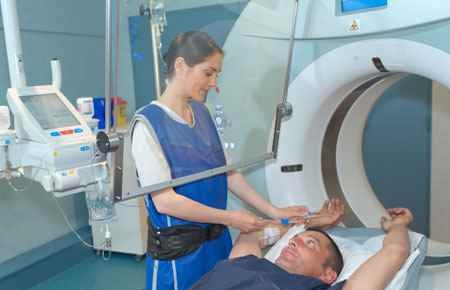
Radiation Protection/Health Physics Technician Major
This major is a program that prepares individuals, under the supervision of health physicists, occupational safety and health specialists, and public health officials, to monitor and control radiation exposure and implement preventive measures in health care, work, and natural environments.
Includes instruction in radiation physics, environmental radioactivity, radiological instrumentation, electronics of radiation detection equipment, radioactive waste management and control, safety and handling procedures, decontamination procedures, radioactivity testing and analysis, and communications skills.
What can you do with a major/degree in Radiation Protection/Health Physics Technician Major?
Radiation Protection: In healthcare settings, if you work as a Radiation Protection Technician, it is your job to monitor radiation levels and address concerns about exposure relative to tests, procedures, and treatments of patients associated with nuclear medicine. This environment you work in can include hospitals, healthcare facilities, treatment centers and research environments.
Job opportunities for radiation protection technicians are only satisfactory in the future as this career subsector is expected to see little growth 2019-2029.
Typically, an earned associate degree is required to enter this career area. However, a certificate is sometimes sufficient with on-the-job training. Most states require license and/or certification.
Health Physics Technician: In the capacity of a Health Physics Technician, you work to protect people and their environment from potential radiation hazards, while making it possible to enjoy the beneficial uses of radiation. Relative to Allied Health, you may work in a variety of areas where individuals receive radiation sources relative to diagnostics and treatment of human diseases, including hospitals, clinics, and major medical centers.
Job opportunities for health physics technicians are likely in the future as this career subsector is expected to see a four percent (4%) growth 2019-2029.
Educational requirements for health physicist technicians range from an associate degree to a PhD in health physics or a closely related field. A basic education in the physical sciences is necessary.
Trade Associations and Professional Organizations in Radiation Protection/Health Physics Technician Major
Professional associations are groups of professionals dedicated to topics in specific fields. Professional associations provide a wealth of online resources, some of which are geared specifically towards students. These organizations typically also host conferences and events, providing great opportunities for learning and networking across your field of interest.
- National Registry of Radiation Protection Technologists
- North American Young Generation in Nuclear
- Women in Nuclear
- The Health Physics Society
Publications/Magazines in Radiation Protection/Health Physics Technician Major